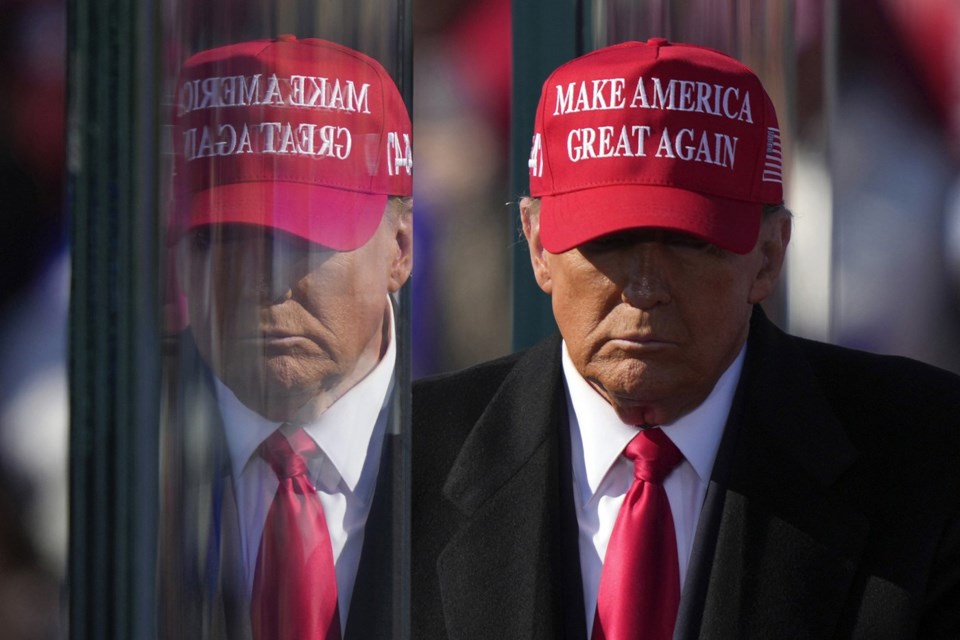WASHINGTON (AP) — A presidential campaign that has careened through a felony trial, an incumbent president being pushed off the ticket and multiple assassination attempts comes down to a final push across a handful of states on the eve of Election Day.
Kamala Harris will spend all of Monday in Pennsylvania, whose 19 electoral votes offer the largest prize among the states expected to determine the Electoral College outcome. The vice president and Democratic nominee will visit working-class areas including Allentown and end with a late-night Philadelphia rally that includes Lady Gaga and Oprah Winfrey.
Donald Trump plans four rallies in three states, beginning in Raleigh, North Carolina and stopping twice in Pennsylvania with events in Reading and Pittsburgh. The Republican nominee and former president ends his campaign the way he ended the first two, with a late Monday night event in Grand Rapids, Michigan.
About 77 million Americans already have voted early, but Harris and Trump are pushing to turn out many millions more supporters on Tuesday. Either result on Election Day will yield a historic outcome.
A Trump victory would make him the first incoming president to have been indicted and convicted of a felony, after his hush-money trial in New York. He will gain the power to end other federal investigations pending against him. Trump would also become the second president in history to win non-consecutive White House terms, after Grover Cleveland in the late 19th century.
Harris is vying to become the first woman, first Black woman and first person of South Asian descent to reach the Oval Office, four years after she broke the same barriers in national office by becoming President Joe Biden’s second in command.
The vice president ascended to the top of the Democratic ticket after Biden's disastrous performance in a June debate set into motion his withdrawing from the race. That was just one of a series of convulsions that have hit this year's campaign.
Trump survived by millimeters a would-be assassin's bullet at a rally in Butler, Pennsylvania. His Secret Service detail foiled a second attempt in September when a gunman had set up a rifle as Trump golfed at one of his courses in Florida.
Harris, 60, has played down the historic nature of her candidacy, which materialized only after the 81-year-old president ended his reelection bid after his June debate against the 78-year-old Trump accentuated questions about Biden's age.
Instead, Harris has pitched herself as a generational change, emphasized her support for abortion rights after the Supreme Court's 2022 decision ending the constitutional right to abortion services, and regularly noted the former president's role in the Jan. 6 attack on the U.S. Capitol. Assembling a coalition ranging from progressives like Rep. Alexandria Ocasio-Cortez of New York to Republican former Vice President Dick Cheney, Harris has called Trump a threat to democracy and late in the campaign even embraced the critique that Trump is accurately described as a “fascist.”
Heading into Monday, Harris has mostly stopped mentioning Trump. She is promising to solve problems and seek consensus, while sounding an almost exclusively optimistic tone reminiscent of her campaign's opening days when she embraced “the politics of joy” and the campaign theme “Freedom.”
“From the very start, our campaign has not been about being against something, it is about being for something,” Harris said Sunday evening at Michigan State University.
Trump, renewing his “Make America Great Again” and “America First” slogans, has made his hard-line approach to immigration and withering criticisms of Harris and Biden the anchors of his argument for a second administration. He's hammered Democrats for an inflationary economy, and he's pledged to lead an economic “golden age,” end international conflicts and seal the U.S. southern border.
But Trump also has veered often into grievances over being prosecuted after trying to overturn Biden's victory and repeatedly denigrated the country he wants to lead again as a “failed nation.” As recently as Sunday, he renewed his false claims that U.S. elections are rigged against him, mused about violence against journalists and said he “shouldn't have left” the White House in 2021 — dark turns that have overshadowed another anchor of his closing argument: “Kamala broke it. I will fix it.”
The election is likely to be decided across seven states. Trump won Pennsylvania, Michigan and Wisconsin in 2016 only to see them flip to Biden in 2020. North Carolina, Georgia, Arizona and Nevada add the Sun Belt swath of the presidential battleground map.
Trump won North Carolina twice and lost Nevada twice. He won Arizona and Georgia in 2016 but saw them slip to Democrats in 2020.
Harris’ team has projected confidence in recent days, pointing to a large gender gap in early voting data and research showing late-deciding voters have broken her way. They also believe in the strength of their campaign infrastructure. This weekend, the Harris campaign had more than 90,000 volunteers helping turn out voters — and knocked on more than 3 million doors across the battleground states. Still, Harris aides have insisted she remains the underdog.
Trump's team has projected confidence, as well, arguing that the former president's populist appeal will attract younger and working-class voters across racial and ethnic lines. The idea is that Trump can amass an atypical Republican coalition, even as other traditional GOP blocks — notably college-educated voters — become more Democratic.
___
AP White House Correspondent Zeke Miller contributed to this report.
Bill Barrow, The Associated Press



